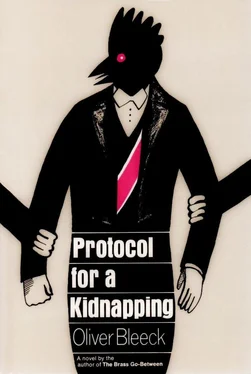By having me as a client, Greene mistakenly believed that he injected an occasional dose of excitement, intrigue, and God knows what else into what he considered to be his otherwise staid life. And if he usually had to pay for it with asthma, annoyance, and even anger, he seemed to feel that it was well worth the price and I was too diffident to tell him that it wasn’t.
Earlier in the day, Myron Greene had called and tried to explain, in between wheezes, that he had to see me immediately, within the hour — sooner, if possible. I’d interrupted him to ask, “You ever call that doctor I recommended?”
“What doctor?”
“The specialist in psychosomatic disorders.”
“My asthma is not a psychosomatic disorder and I resent your—”
“Calm down, Myron,” I’d said. “Take a deep breath.”
“Damn it,” he’d said, “what I have to see you about is important.”
“So is my meeting.”
Myron Greene had been silent for several moments. Not even a wheeze. He could have been counting to ten — or perhaps twenty. “All right,” he’d said finally, “how long does this circus of yours last?”
“Thirty minutes, I think. Maybe forty-five.”
“Well, I have to do downtown around four. I suppose I could stop by. Where is it again?”
I’d given him the address and he’d wheezed as he wrote it down. I assumed that he wrote it down. “This is the most childish — the most juvenile—”
“No, it isn’t, Myron.”
“If it’s not juvenile, what do you call it?”
“A noble cause,” I’d said and hung up.
Wisdom was explaining that we were holding a combination membership meeting and press conference and that he would now entertain questions from the press. If he couldn’t answer them, he was sure that Mr. St. Ives could, or perhaps Mr. Knight, providing that the chairman pro tem had recovered sufficiently from his emotional ordeal.
The man from the CBS television station was up first. Wisdom acknowledged him with a grand wave of the pince-nez. “Mr. Wisdom,” he said, “could you explain once more for our viewers just what CHEAPAR stands for?”
“Delighted,” Wisdom said, “CHEAPAR is an acronym which stands for the Committee for Humane Extermination of All Park Avenue Rats.”
The Daily News wanted to know what was so special about Park Avenue rats. It was one of the questions that Wisdom was waiting for.
“You must understand,” he said with another fine flourish of the pince-nez, “that only recently have rats invaded Park Avenue. A number of residents there complained. I did so myself — as did most, if not all, of the ladies and gentlemen here today. This is understandable.”
He put the pince-nez back on his nose and started jabbing at the air with a forefinger. “I want to make it perfectly clear that CHEAPAR is no organization of bleeding hearts. We well recognize that rats, through no fault of their own, are often the carriers of dread disease.
“But,” he said, taking off the pince-nez and again holding it up for emphasis, “no sooner had our complaints been lodged than the city responded with what can only be described as terrifying alacrity. The Park Avenue rats were singled out for mass slaughter by the most barbaric means — as Mr. Knight tried to tell you before he was overcome by the horror of his own description.”
Wisdom paused to give Knight a benign look and Knight let the audience have another glance at his profile before he ducked it back into his handkerchief.
The Post reporter wanted to know what Wisdom suggested. “Decompression,” he answered quickly. “The rats should be captured alive in cagelike traps and then put to sleep in a chamber from which the air is almost instantaneously removed. The method is recommended by many humane societies. It’s quick and painless — just like taking a nice, long nap.” That got another fine round of applause from the audience. I noticed that Myron Greene now held his head in his hands.
A wire service reporter asked if CHEAPAR planned to limit its operations to the rats on Park Avenue.
“Certainly,” Wisdom answered with some asperity.
When the wire service man wanted to know why, Wisdom replied, “Because Park Avenue rats — and I don’t make this charge lightly — but Park Avenue rats are the only ones being discriminated against by the City of New York.”
Well, that was the lead and they all knew it and, as usual, they went along with Wisdom who could be counted on to brighten their day about seven or eight times a year. The girl from The Village Voice, struggling to keep a straight face, asked, “Can you explain what form this discrimination against Park Avenue rats takes as opposed, say, to the rats of Harlem or Greenwich Village or Bedford-Stuyvesant?”
“Indeed I can,” Wisdom said. “Take your average rat in Harlem. Nobody bothers him, particularly not the City. He’s left alone as long as he stays in Harlem. But let him try to improve his lot, let him try to move downtown to Park Avenue, and the vicious, discriminatory rat control forces are unleashed. He is clubbed, poisoned, and there is even talk of using — yes, there is! There are those who would use gas!” That produced a sharp chorus of no’s from the audience and another faint cheer from the press. Myron Greene was now slumped back in his chair, staring at the dirty ceiling. Knight whimpered a couple of times.
The Times man gave up a valiant battle to maintain his grave expression and asked, “Do you think, Mr. Wisdom, that politics or pressure may have caused this — uh — discrimination?”
“Possibly, sir, possibly. Thus far, we have had no complaints of rat brutality from any area other than Park Avenue. We of course hope that this is not a political football, but nevertheless we have asked Mr. St. Ives to investigate.”
“How about it, Phil?” the man from the Post asked.
I rose and nodded in what I hoped was a somber fashion. “Our preliminary survey,” I said, “indicates that both politics and pressure have played no small part in the discriminatory brutalization of Park Avenue rats. We’re preparing a White Paper on this and I hope to have copies of it to you within the next few days.”
There was a muffled groan from the rear that came from Myron Greene who had his head back in his hands.
After several more questions the man from the Times said, “Thank you, Mr. Wisdom,” and the press conference was over. The superannuated audience, representing a collective net worth of around a half-billion dollars, rose creakily and crowded about Wisdom and Knight to congratulate one and comfort the other.
I walked to the rear to find out what Myron Greene considered so important that he would stop off at a hired hall on his way downtown. After listening for ten minutes, I agreed that it might be important, even vital, but told him that I wasn’t interested. It took him another fifteen minutes to tell me why I was.
There had been a time, nearly five years ago, when I might have been sitting in that rented hall on Thirty-ninth Street with the rest of the press, feeding lines to Wisdom and Knight, more or less serving as an accommodating shill for their put-on.
But then it had been my job to write a column five times a week for a now defunct and largely un-mourned newspaper about the cards and cautions who infest New York. I had developed a breezy, perhaps irreverent style, the source material had been limitless, the hours flexible, and I found myself with a respectable readership and inexplicably the trust and confidence of a swarm of thieves, cops, hustlers, high rollers, con men, prophets, assorted saviors, bums, middle echelon Mafiosi, and people who seemed to spend most of their time hanging around telephone booths waiting for someone to call.
Читать дальше












